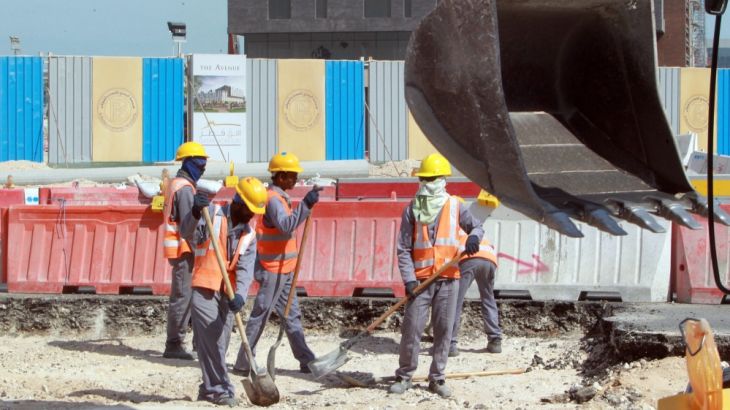Amnesty: Qatar World Cup stadium workers suffer abuse
Living conditions and delayed salaries among concerns raised but Qatar says reforms are being implemented.

Workers in Qatar renovating a stadium for the 2022 World Cup have suffered rights abuses two years after the tournament’s organisers drafted worker welfare standards in the wake of criticism, Amnesty International said.
According to a report released on Thursday, dozens of construction workers from Nepal and India were housed in squalid accommodation and barred from leaving the country by employers in Qatar who confiscated their passports.
Keep reading
list of 4 itemsCristiano Ronaldo scores winner in record 200th game for Portugal
Kylian Mbappe informs PSG he will not extend contract: Media
Qatar World Cup: Watchdog says FIFA’s carbon-neutral claims false
The Supreme Committee for Delivery & Legacy, the organisers for the 2022 World Cup, told Al Jazeera that “the conditions reported were not representative of the entire work force on Khalifa [the stadium where the workers were interviewed]”.
|
|
Between February and May 2015, Amnesty says it interviewed 132 workers involved in the rebuilding of the Khalifa stadium, a sporting complex in Doha that is set to host one of the knockout games of the tournament.
The report said staff from one labour-supply firm threatened to withhold pay and report workers to police to exact labour from migrants, which the group called “forced labour”.
When Amnesty International researchers returned to Qatar in February 2016, some of the workers had been moved to better accommodation and their passports returned by companies responding to the findings.
“The abuse of migrant workers is a stain on the conscience of world football,” said Amnesty International Secretary General Salil Shetty.
“For players and fans, a World Cup stadium is a place of dreams. For some of the workers who spoke to us, it can feel like a living nightmare.”
Many of the points raised in the report have already been addressed, according to Qatar’s Government Communication Office, and the Supreme Committee for Delivery & Legacy confirmed that two of the contractors named in the report “are no longer eligible to work on future projects”.
“We are concerned by a number of allegations contained within the report,” a statement from the Government Communication Office said.
“The Ministry of Administrative Development, Labour and Social Affairs intends to investigate the contractors named in the report,” the statement said.
READ MORE: FBI to probe Russia and Qatar World Cup bids
Hassan Al Thawadi, Qatar’s 2022 committee chief, said Amnesty had highlighted “malpractices” faced by some of the 5,100 construction workers building stadiums, a figure set to increase sevenfold to 36,000 in the next two years.
|
|
“We’ve always recognised that we don’t have a magic wand that could fix the matter from the very beginning,” Thawadi told reporters in Doha on Monday, calling the World Cup a “catalyst for change”.
“We’re resolving gaps day by day.”
Following persistent criticism from rights groups of its ‘Kafala’ sponsorship laws, Qatar last year introduced electronic payment of salaries and created an appeal process for workers if employers do not sanction their leaving the country.
The sponsorship system, variants of which are used across the Gulf, binds workers to their employers by requiring them to get permission to change jobs or leave the country.
READ MORE: Qatar rebuffs England FA criticism over 2022 World Cup
“Amnesty International’s investigation was limited to just four companies out of more than 40 currently engaged on Khalifa International Stadium,” said a Qatar 2022 committee statement sent to Al Jazeera.
“The conditions reported were not representative of the entire work force on Khalifa. As a result of the Supreme Committee’s continued enforcement and monitoring efforts, many of the issues raised had been addressed by June of 2015, months before the publication of Amnesty’s report.
“In June 2015 – seven months before Amnesty contacted us – Nakheel Landscapes had undergone a comprehensive rectification process, and are one of the most compliant companies on site. Eversendai, although having gone through a significant rectification process, have been banned from subsequent World Cup projects until they can demonstrate sustainable improvements.”
Criticism and allegations
Qatar was awarded hosting rights for the World Cup six years ago, a move that was heavily criticised not only due to the alleged human rights violations in the country but also the extreme summer heat that would make it impossible for the tournament to take place in the traditional months of June and July.
Last year, FIFA confirmed that the World Cup will be moved to ‘cooler months’ and the final of the tournament will be played on December 18, Qatar’s national day.
Swiss authorities announced a criminal investigation into the bidding process for the 2018 and 2022 World Cups last May, the same day that US authorities indicted nine FIFA officials and five business executives on corruption charges.
The organisers have repeatedly denied all allegations of bribery and corruption during the bidding process.
![Temperatures in Qatar in the months of June and July can reach up to 50C [AP]](/wp-content/uploads/2015/05/40c0f7e44ed54ec9949e74205b6a18ab_18.jpeg)